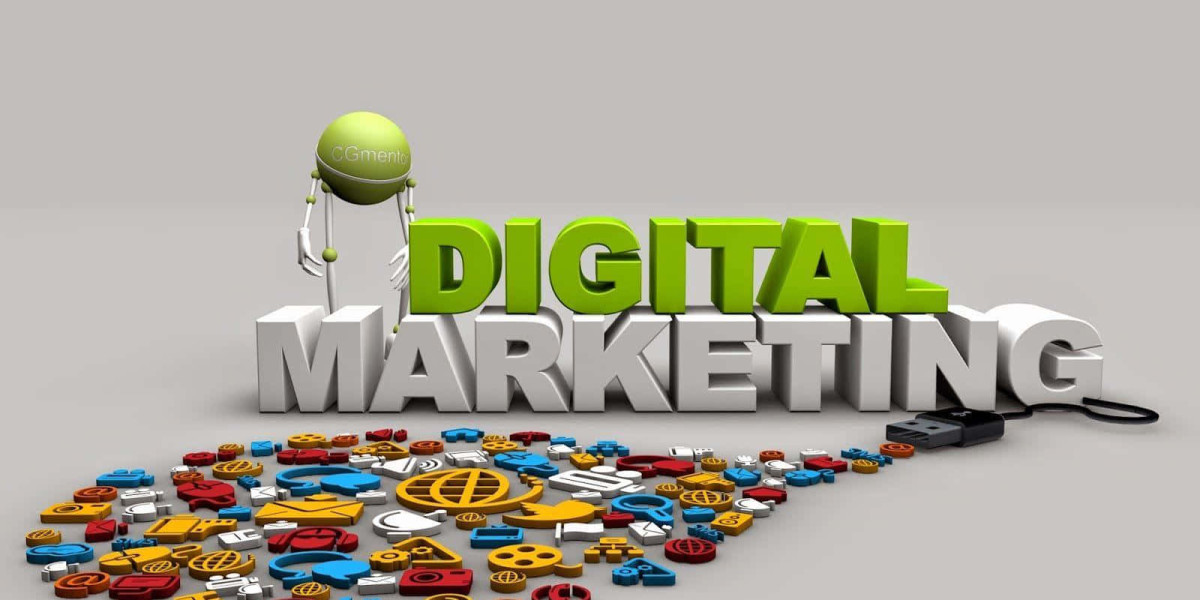In the ever-evolving world of business, digital marketing has emerged as a cornerstone for success. With businesses and consumers shifting their attention online, digital marketing offers a dynamic and highly effective way to reach target audiences, build brand awareness, and drive sales. This comprehensive guide will explore what digital marketing is, why it's important, the services it encompasses, key strategies, techniques, benefits, and the future of this fast-growing field.
What is Digital Marketing?
Digital marketing refers to the promotion of products, services, or brands through various digital channels, such as search engines, social media, email, websites, and mobile apps. It focuses on reaching a targeted audience in real-time, providing measurable results that allow businesses to optimize their marketing efforts. Unlike traditional marketing, digital marketing is data-driven, offering precise targeting and personalized communication.
Why is Digital Marketing Important?
In today’s highly connected world, consumers spend a significant amount of time online. This makes digital marketing essential for businesses to stay relevant and competitive. Here’s why digital marketing is important:
- Wider Audience Reach: Digital marketing allows businesses to reach a global audience, breaking geographic barriers.
- Cost-Effective: Compared to traditional marketing, digital marketing offers a higher return on investment (ROI) with lower costs.
- Measurable Results: Digital marketing tools provide detailed analytics, enabling businesses to track performance and optimize campaigns in real-time.
- Enhanced Customer Engagement: With strategies like social media marketing, businesses can interact directly with their customers, fostering relationships and building loyalty.
What Services Are Included in Digital Marketing?
Digital marketing is a broad field that encompasses various services, each designed to target specific goals. Key services include:
- Search Engine Optimization (SEO): Optimizing your website to rank higher on search engine results pages (SERPs) and drive organic traffic.
- Pay-Per-Click (PPC) Advertising: Paid ads that appear on search engines or social media platforms based on user intent or demographics.
- Content Marketing: Creating and sharing valuable content (blogs, videos, infographics) to attract and engage an audience.
- Social Media Marketing: Promoting your brand on social platforms like Facebook, Instagram, LinkedIn, and Twitter to drive engagement and brand visibility.
- Email Marketing: Sending targeted messages to your audience via email to nurture leads, promote products, or provide valuable information.
- Affiliate Marketing: Partnering with affiliates who promote your products or services in exchange for a commission on sales.
- Influencer Marketing: Collaborating with influencers to promote your brand to their followers.
- Mobile Marketing: Reaching your audience through mobile devices via SMS, in-app ads, or push notifications.
Key Strategies in Digital Marketing
A successful digital marketing campaign requires a well-thought-out strategy. Key strategies include:
- Target Audience Definition: Identifying and understanding the specific needs, behaviors, and preferences of your target audience.
- Personalization: Tailoring content and offers based on user preferences, demographics, or behaviors.
- Customer Journey Mapping: Understanding the stages a customer goes through from awareness to purchase and optimizing touchpoints accordingly.
- Omnichannel Marketing: Ensuring a seamless experience across all digital channels, whether it's a website, mobile app, or social media.
- Content Strategy: Developing a plan for creating and distributing valuable content that resonates with your audience.
Techniques Used in Digital Marketing
Various techniques are employed to implement digital marketing strategies effectively. These include:
- Search Engine Optimization (SEO): Using keywords, on-page optimization, and backlinking to improve a website’s visibility on search engines.
- Pay-Per-Click (PPC) Ads: Running ads on platforms like Google Ads and Facebook Ads to drive traffic based on user searches or interests.
- Email Segmentation: Dividing an email list into segments based on user behavior or demographics for more targeted communication.
- A/B Testing: Comparing two different versions of a webpage, email, or ad to determine which performs better.
- Retargeting: Displaying ads to users who have previously visited your website but did not convert, to encourage them to return.
Benefits of Digital Marketing
Digital marketing offers numerous advantages for businesses of all sizes. Key benefits include:
- Cost-Effectiveness: Digital marketing is more affordable than traditional marketing, allowing even small businesses to compete with larger companies.
- Precise Targeting: With tools like PPC and social media ads, businesses can target specific demographics, interests, and behaviors.
- Higher Engagement: Digital channels allow for two-way communication, enabling businesses to interact with customers and receive real-time feedback.
- Global Reach: Digital marketing enables businesses to operate beyond local markets and reach international audiences.
- Measurable Performance: Detailed analytics offer insights into campaign performance, allowing businesses to make data-driven decisions.
- Flexibility and Adaptability: Digital marketing strategies can be adjusted in real-time to adapt to changing market trends or consumer behaviors.
Future of Digital Marketing
The future of digital marketing is promising and constantly evolving with advancements in technology. Here are some trends that are expected to shape the future of digital marketing:
- AI and Machine Learning: AI is already transforming digital marketing by enabling businesses to analyze consumer behavior and automate marketing processes. AI-powered chatbots, predictive analytics, and personalized recommendations are becoming more common.
- Voice Search Optimization: As more consumers use voice-activated devices like smart speakers, optimizing for voice search will be crucial.
- Augmented Reality (AR) and Virtual Reality (VR): These immersive technologies are creating new opportunities for brands to engage with consumers in interactive and memorable ways.
- Data Privacy and Security: With growing concerns over data privacy, businesses must prioritize compliance with regulations like GDPR and ensure transparent data practices.
- Sustainability and Ethical Marketing: Consumers are increasingly valuing brands that prioritize sustainability and ethical practices. Digital marketing campaigns that emphasize corporate social responsibility will have a competitive edge.
Conclusion
Digital marketing is an essential tool for modern businesses, offering a range of services and strategies to reach and engage with consumers effectively. From SEO and content marketing to social media and email campaigns, digital marketing enables businesses to grow their online presence, build relationships with their audience, and drive measurable results. As technology continues to evolve, the future of digital marketing holds endless possibilities, making it a vital component of any successful business strategy.
As a Digital Marketing Services provider, I focus on developing customized strategies to elevate brand visibility and drive engagement. With expertise in SEO, social media, and content marketing, I empower businesses to thrive in the competitive online landscape.



